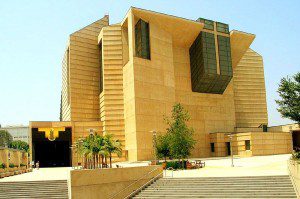
Los Angeles, California
(Wikimedia Commons; click to enlarge)
I have to be honest: I don’t care all that much for the Cathedral’s exterior. But the interior is quite impressive.
I have to admit that, while I once thought that my own church was largely immune to these sorts of influences, I’m not quite so confident any more:
http://www.realclearreligion.org/articles/2016/01/23/what_secularism_wrought_in_catholicism.html
I have great confidence in the Brethren. I believe them to be genuine apostles and prophets. But I worry at what I see as an increasing tendency on the part of too many intellectually-inclined and/or politically active Latter-day Saints to take their governing principles not so much from the doctrines of the Restoration as from the secular ideologies that are dominant in the ambient culture.
Please don’t get me wrong: I think it’s healthy, desirable, even necessary to be in constant dialogue with the best thought and insight of the contemporary age, and I believe that much can be learned from such dialogue. I also love the Reformation description of the Christian church as semper reformanda or “always reforming” — Ecclesia semper reformanda est — and am convinced that we do best when we search and question. (See my little essay entitled “Questioning: The Divine Plan.”)
But there’s a seemingly slight but enormously important difference between interacting with the best thinking around us, on the one hand, and, on the other, allowing ourselves to be governed by human thought rather than by divine revelation.
Those who reject the possibility or, at least, the reality of such revelation will, of course, dismiss the difference as illusory and regard all of this as simply yet another instance of religious obscurantism.
Those, however, who are at least open to the possibility of such divine revelation will grasp the importance of the point.
In my view, it’s very useful to watch what’s going on in the Roman Catholic Church and other Christian religious communities, and to learn from them. Are we really immune to the issues they’re facing, or are we simply a few years behind?












